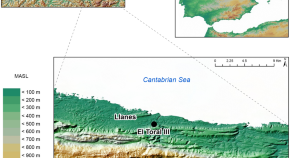Living in the shore: changes in coastal resource intensification during the Mesolithic in northern Iberia
Authors (first, second and last of 5)

Collection
The research of Dr. García-Escárzaga mainly focuses on deciphering subsistence strategies and the human behaviour of the mesolithic populations in the northern Iberian Peninsula (10.5 - 6.7 ka BP). Dr Garci-Escarzaga research also focuses on better understanding the impact of abrupt climate changes that occurred at the Early Holocene in this littoral area, as for example the 8.2 ka BP cold event. To achieve these goals, she applies stable oxygen isotope ratio and trace elements ratio analyses on marine mollusc shells.
Dr C. Duarte Simões is a geoarchaeologist, with an interdisciplinary and international training, currently holding a Widening Fellowship from the European Union’s Horizon 2020 research and innovation programme to develop the SEArch project at ICArEHB.
Dr Diogo Monteiro is an archaeobotanist, specialized in charcoal analyses and a PhD in Archaeology, from the University of Algarve, that focused on firewood acquisition modalities of the Mesolithic hunters and gatherers of Muge shellmiddens, a project funded by FCT.
Dr Dias is an Archaeologist, specialized in Zooarchaeology, more specifically in Ichthyological remains and seasonality studies through the use of Sclerochronology and Stable isotopes analysis on fish remains.
Dr. Sierra has focused his research on Archaeozoology, specifically studying animal domestication and integrating biogeochemical and structural methods. He conducted research in the Neolithic societies of the Mediterranean basin and trained at national and international centers, including the University of Zaragoza, Autonomous University of Barcelona, Natural History Museum in Paris, the University of York or the IPHES in Tarragona. He actively participates in multiple research projects, directs one under his grant, and has teaching experience at universities. Currently affiliated with Autonomous University of Barcelona.


